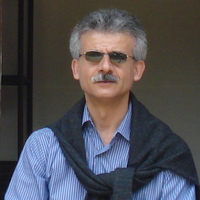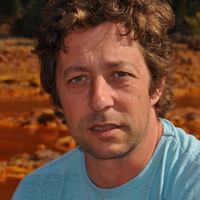
Aline Carvalho
Researcher at the Center for Environmental Studies and Research (NEPAM), at the University of Campinas (Unicamp), in Campinas, São Paulo, Brazil. Currently is the coordinator of NEPAM and of the Laboratory of Public Archaeology Paulo Duarte (LAP) also at Unicamp. Investigates themes of Material and Imaterial Heritage, Public Archaeology and Environmental History. At the moment, is working on the impact of climate changes in the brazilian archaeological heritage. Has an undergraduate and a masters degree in History and has a PhD in Environmental and Society, all of them by Unicamp. Is a professor in the post graduation program at Unicamp and is associated with International Consul on Monuments and Sites (ICOMOS), European Association of Archaeologists (EAA), Brasilian Archaeology Society (SAB) and other institutions. E-mail contact: alineap@unicamp.br ___Sou pesquisadora no Núcleo de Estudos e Pesquisas Ambientais da Unicamp (NEPAM), onde desenvolvo investigações interdisciplinares nas grandes áreas das Ciências Ambientais e da História a partir dos recortes temáticos vinculados ao Patrimônio, Memória e a Arqueologia Pública. Investigo, por exemplo, como construir indicadores de vulnerabilidade socioambiental para o patrimônio arqueológico do litoral norte de São Paulo. Atuo como responsável pelo Laboratório de Arqueologia Pública Paulo Duarte (LAP Nepam/Unicamp). Desenvolvo atividades como professora plena dos programas de pós-graduação em Ambiente e Sociedade (NEPAM/IFCH/Unicamp), em História (IFCH/Unicamp) e no Mestrado Profissionalizante em História (ProfHistória/IFCH/Unicamp). Participo de grupos de pesquisa do CNPq, em Grupos de Trabalhos do ICOMOS, da Anpuh, entre outras instituições, sobre as temáticas da História Ambiental, Arqueologia Pública e Patrimônio. Possuo o título de doutorado pelo Núcleo de Estudos e Pesquisas Ambientais (Nepam/ IFCH/Unicamp: 2005- 2009) e mestrado em História Cultural (História/IFCH/ Unicamp: 2003/2005). No campo internacional, participo de redes de pesquisa sobre patrimônio biocultural coordenada pela UNAM/Mx. Realizei o pós-doutorado no Departamento de História/Unicamp. Atualmente, coordeno o Núcleo de Estudos e Pesquisas Ambientais/Unicamp (2016-2020). ___________
less
Related Authors
Andrej Dujella
University of Zagreb
Hemin Koyi
Uppsala University
Jana Javornik
University of East London
Graham Martin
University of Leicester
Gwen Robbins Schug
University of North Carolina at Greensboro
Gabriel Gutierrez-Alonso
University of Salamanca
John Sutton
Macquarie University
Eros Carvalho
Universidade Federal do Rio Grande do Sul
Kevin Arbuckle
Swansea University
Jesper Hoffmeyer
University of Copenhagen










Uploads
Papers by Aline Carvalho
Este trabalho almeja levantar um debate sobre os processos de patrimonialização em Unidades de Conservação brasileiras, jogando luz sobre as problemáticas que envolveram as comunidades na criação do Parque Nacional da Serra da Capivara e as soluções apresentadas por seus gestores para contorná-las. Para isso, em um primeiro momento, são abordados os conceitos de patrimonialização, Unidades de Conservação e patrimônio cultural. Em seguida, apresenta-se uma discussão acerca do status de patrimônio em Unidades de Conservação brasileiras. Posteriormente, analisa-se o caso específico do Parque Nacional da Serra da Capivara. Por último, demonstra-se a complexidade da gestão cultural e ambiental de um bem patrimonial, apontando para a importância de que essa gestão seja feita de forma ampla e inclusiva.
just about the reading, the reflection on the topic read and the transformation of those
reflections into knowledge applicable to particular studies objects. Unlike texts produced
on our own case studies, the practice of producing a review relates to the responsibility
of building a door that will invite the readers to step into the reviewed book. The review,
in this context, becomes a potential invitation to build relationships without any other
textual intermediations between the reader and the work reviewed; exceeding, thus, the
review itself. What I can say categorically is that the production movement of this review
was really joyful, and that the reader will find in the book presented here, skilled texts
in the institutional analysis of issues related to complex social arenas linked to environmental
issues in Brazil.
The book Environmental Governance in Brazil - between socioenvironmentalism
and the green economy, organized by researchers Fábio de Castro and Celia Futemma,
was published in 2015 by Paco. The motivations for the creation of the book, however,
are settled in a context prior to the year of publication: particularly in processes of construction
of the United Nations Conference on Sustainable Development (UNCSD), also
named as Rio+20, held in 2012 between the 13th and 22nd of June in the Brazilian city
of Rio de Janeiro. Generally speaking, we can say that the goal of Rio+20 was to discuss
the renewal of political commitments to sustainable development and thus it was in open
dialogue with the previous conferences
Books by Aline Carvalho
Este trabalho almeja levantar um debate sobre os processos de patrimonialização em Unidades de Conservação brasileiras, jogando luz sobre as problemáticas que envolveram as comunidades na criação do Parque Nacional da Serra da Capivara e as soluções apresentadas por seus gestores para contorná-las. Para isso, em um primeiro momento, são abordados os conceitos de patrimonialização, Unidades de Conservação e patrimônio cultural. Em seguida, apresenta-se uma discussão acerca do status de patrimônio em Unidades de Conservação brasileiras. Posteriormente, analisa-se o caso específico do Parque Nacional da Serra da Capivara. Por último, demonstra-se a complexidade da gestão cultural e ambiental de um bem patrimonial, apontando para a importância de que essa gestão seja feita de forma ampla e inclusiva.
just about the reading, the reflection on the topic read and the transformation of those
reflections into knowledge applicable to particular studies objects. Unlike texts produced
on our own case studies, the practice of producing a review relates to the responsibility
of building a door that will invite the readers to step into the reviewed book. The review,
in this context, becomes a potential invitation to build relationships without any other
textual intermediations between the reader and the work reviewed; exceeding, thus, the
review itself. What I can say categorically is that the production movement of this review
was really joyful, and that the reader will find in the book presented here, skilled texts
in the institutional analysis of issues related to complex social arenas linked to environmental
issues in Brazil.
The book Environmental Governance in Brazil - between socioenvironmentalism
and the green economy, organized by researchers Fábio de Castro and Celia Futemma,
was published in 2015 by Paco. The motivations for the creation of the book, however,
are settled in a context prior to the year of publication: particularly in processes of construction
of the United Nations Conference on Sustainable Development (UNCSD), also
named as Rio+20, held in 2012 between the 13th and 22nd of June in the Brazilian city
of Rio de Janeiro. Generally speaking, we can say that the goal of Rio+20 was to discuss
the renewal of political commitments to sustainable development and thus it was in open
dialogue with the previous conferences